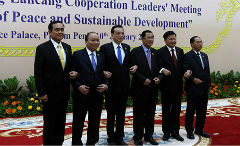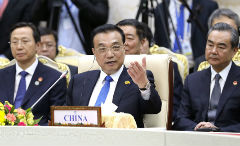Cambodia highly values Lancang-Mekong Cooperation leaders’ meeting, Chinese premier’s visit
2018-01-11
Xinhua
PHNOM PENH — Cambodian Foreign Minister Prak Sokhonn said the country highly values the second Lancang-Mekong Cooperation (LMC) leaders’ meeting and the visit of Premier Li Keqiang to Cambodia.
Cambodia hosted the second LMC leaders’ meeting in Phnom Penh on Jan 10 and will welcome Premier Li on Jan 11.
In a written interview with Xinhua on Jan 10, Prak Sokhonn said the LMC leaders’ meeting was very important for Cambodia as it presented a unique opportunity for Cambodian Prime Minister Samdech Techo Hun Sen, as a co-founding leader, to invite his colleagues from China and the other four Mekong countries to chart the future course of the LMC into the next decade.
He said Cambodia, as the host nation, has chosen the theme of the meeting as “Our River of Peace and Sustainable Development.”
“It is quite understandable why the spirit behind the establishment of the LMC is peace and development,” he said. “Cambodia and the other five countries share the same source of water, the source of life even, Lancang for the China’s part and Mekong for the other downstream countries, and as such it is imperative to work together to ensure a common destiny of shared security and prosperity.”
The Lancang River originates on the Qinghai-Tibet Plateau in southwestern China. It is called the Mekong River as it flows through Myanmar, Laos, Thailand, Cambodia and Vietnam before emptying into the sea.
The minister said that without peace, there is no security and no development, let alone prosperity.
Prak Sokhonn said the evolving global and regional dynamics are at a critical juncture with threats and challenges, which no one single country could hope to tackle.
“When it comes to cross-boundary environmental challenges and nontraditional security threats facing the Mekong subregion, a very strong political will and mutual trust among the LMC countries are required,” he said.
The minister added that on the other side, many priority areas of cooperation need to be addressed by the six LMC countries in order to unleash and realize the enormous development potentials of the subregion.
The LMC, launched in March 2016, focuses on three pillars — political and security issues, economic and sustainable development, and social and cultural cooperation, and five priority areas of connectivity, production capacity, cross-border economic cooperation, water resources management and agriculture, and poverty reduction.
The minister said the outcomes of the meeting will be instrumental to narrowing the existing development gap in the Mekong subregion and will accelerate the ASEAN Community building.
“On a grander scale, I believe that the LMC could be considered as a new model of South-South cooperation that supports the LMC member countries to deliver economic prosperity to its people under the framework of the United Nations 2030 Agenda for Sustainable Development,” Prak Sokhonn said.
He said the Lancang-Mekong region is well-known for its strategic location and economic dynamics, as well as wealth of traditions, cultures and local values, the diversity of which presents complementary potentials and strengths that can be harnessed for the collective benefit of the LMC countries.
“That is why I am of the view that this 2nd LMC leaders’ summit will consolidate all the political and security, economic, and sociocultural cooperation so as to ensure greater contributions to upholding regional and global stability, sustainable development and prosperity for the subregion,” Prak Sokhonn said.
Speaking about the Sino-Cambodian relations, the minister said that he was proud to attest that it was a model of friendly coexistence and close cooperation.
“The visit of Premier Li Keqiang is another milestone in reinforcing the centuries-old relationship between our two countries,” he said. “His visit coinciding with the celebration of the 60th anniversary of Cambodia-China diplomatic relations provides an extra gust of wind to accelerate the momentum in the Cambodia-China strategic relations.”
He said that with the comprehensive strategic partnership of cooperation well in place since 2010, the two countries have spared no efforts to promote all-dimensional, wide-ranging and in-depth development of the relations with full respect for each other’s core interest, common aspiration for peace, stability and development and well-being of the two peoples.


